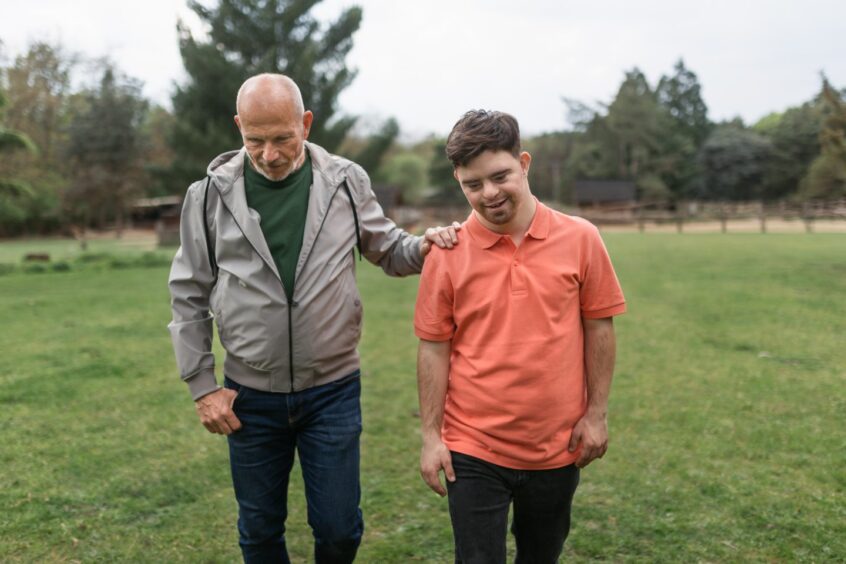Are you looking for a job that’s rewarding and fulfilling? Then you should consider a career in supported living.
-
Some Press and Journal online content is funded by outside parties. The revenue from this helps to sustain our independent news gathering. You will always know if you are reading paid-for material as it will be clearly labelled as “Partnership” on the site and on social media channels.
This can take two different forms.
“Presented by”
This means the content has been paid for and produced by the named advertiser.
“In partnership with”
This means the content has been paid for and approved by the named advertiser but written and edited by our own commercial content team.
Support workers help make a difference in people’s lives, supporting them to live their lives to the fullest and do what they enjoy. The role is about looking after people who have varied support needs, such as physical or learning disabilities or challenges around their mental health.
Sara Wilkinson, service manager at Mears Supported Living, explains: “Much of what we do is about supporting people to lead ordinary lives.
“Crossing the road safely or using public transport may be second nature for most people, but for somebody with a learning disability, they might not be able to read the timetable, process that information and put that into practice. That’s why folks have staff support. We help break down those barriers.”
No two days are the same. One day you could be preparing food, administering medication, doing housework and supporting people to pay bills. Another day, you could be going out and enabling them to take part in activities and their individual interests such as music or sports.
Sara says: “Some of our young people are into video games and going fishing, playing squash or football while others prefer having their hair and nails done. We also support people to attend church, as well as to take part in arts and crafts and jewellery making. The list is endless. We focus on whatever each person likes to do and support them to achieve their personal goals and individual outcomes.
“We like to match staff too so, for example, if I have a member of staff coming on board and I know they like fishing, then it makes sense for us to match them with the person who wants to go fishing.”
Supported Living – a different kind of care
Supported living is hugely different from the type of care and support you might find in a care home. It’s designed to enable people to maintain their own independence, have more control over their daily routines and make their own decisions.
Sara points out: “We spend a much longer period of time with people and we’re working in really small teams. So you get to know the person well. We have the privilege of sharing people’s lives rather than popping in for a short visit.
“It’s wonderful to have the opportunity to work with people, supporting and encouraging them to develop life skills and help them live happier, fulfilled lives.”
Making a difference
As an example, Sara shares how the team has made a difference in the life of a man whose ultimate goal in life was to ride a plane and go on holiday. She says: “Over a period of 18 months, our staff started taking regular bus trips to get the gentleman used to public transport. Then they started to take longer trips, had days out and tried lots of different locations. So once the small trips were familiar and predictable, he wasn’t anxious about them anymore.
“Eventually, he went on a flight with support. I will never forget as long as I live, he phoned me up to tell me that he’d made it to Brighton and was celebrating with a nice, cold drink!”
Training for support workers
Full training is available in all aspects of the role including working a shadow shift alongside a more experienced member of staff. This means there’s plenty of time to get to know the supported person really well and gradually take over more tasks.
The employment engagement programme provides weekly contact with a supervisor from the outset to help all new starters to settle in and succeed in their role.
Flexible working
Mears Supported Living currently supports a diverse range of adults with additional support needs, ranging from people in their early 20s, right up to their 70s. Most people are supported on a 24-hour basis.
There are currently vacancies for both full and part-time support workers in Banff, Macduff, Whitehills, Portsoy and Peterhead, working on a contracted or flexible zero-hour basis.
New starters would be placed on a rolling rota and asked to provide their availability so they can be matched to available shifts. Bank positions are also available for people who don’t necessarily want to work to a set rota, allowing them to work really flexibly.
A full, clean driving license is useful, but not essential.
Sara says: ” There is no other role where you can make such a difference in someone’s life. It can be challenging at times, but it is also incredibly rewarding.
“Our team is caring and compassionate, thoughtful and patient and we’re looking for that more than anything. It’s much more about the values that people have and any transferable skills that they can bring to the role.”
Sara ends: “If we have happy and confident support workers, we’ll generally have happy and confident supported people. That’s really important.”
If you have a caring nature, love supporting others and have a can-do attitude, working in supported living could be the perfect fit for you.
For more information, visit Mears Careers website or email Jacolyn.Duncan@mearsgroup.co.uk

